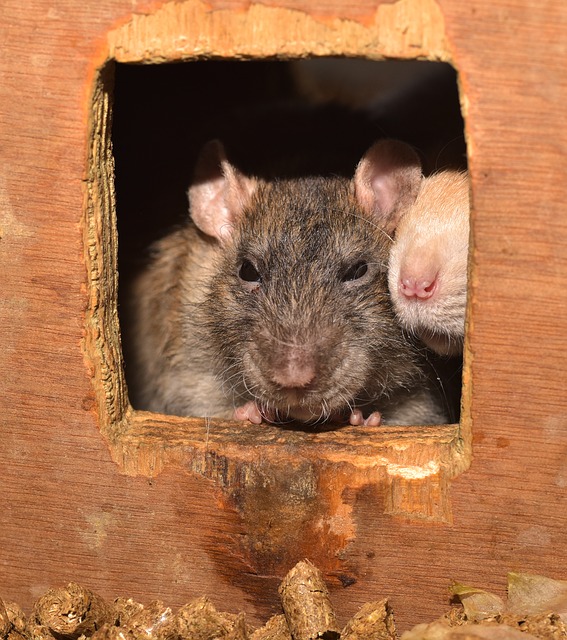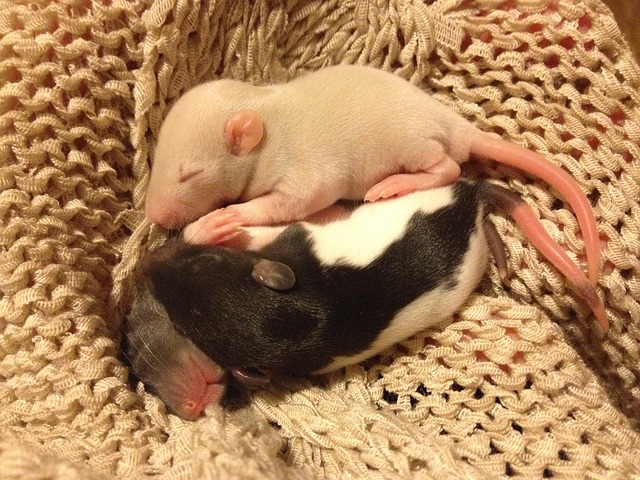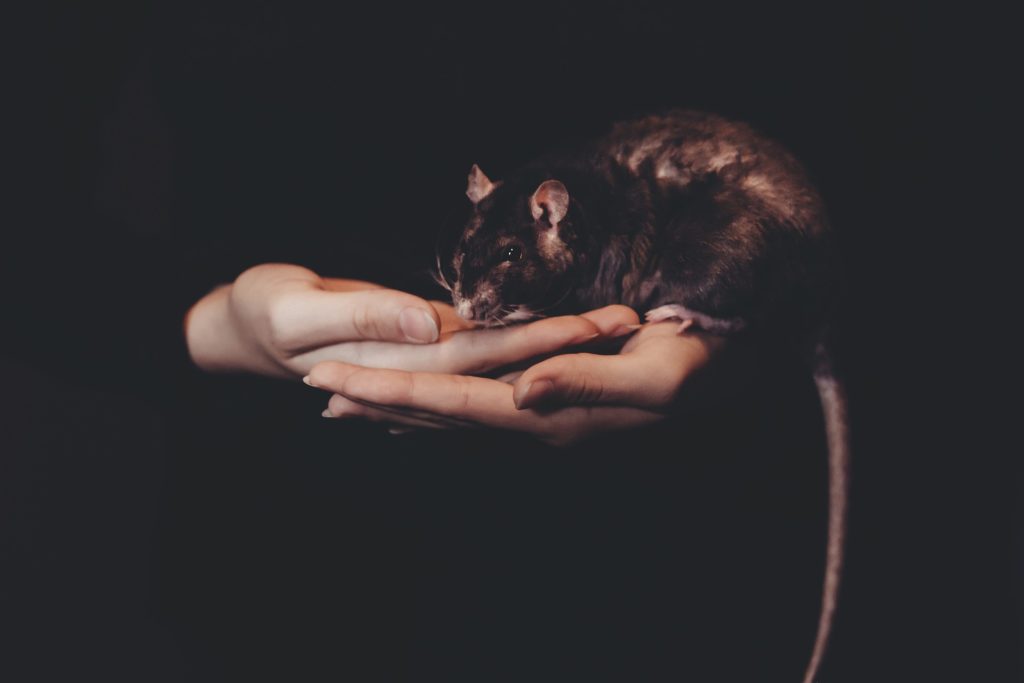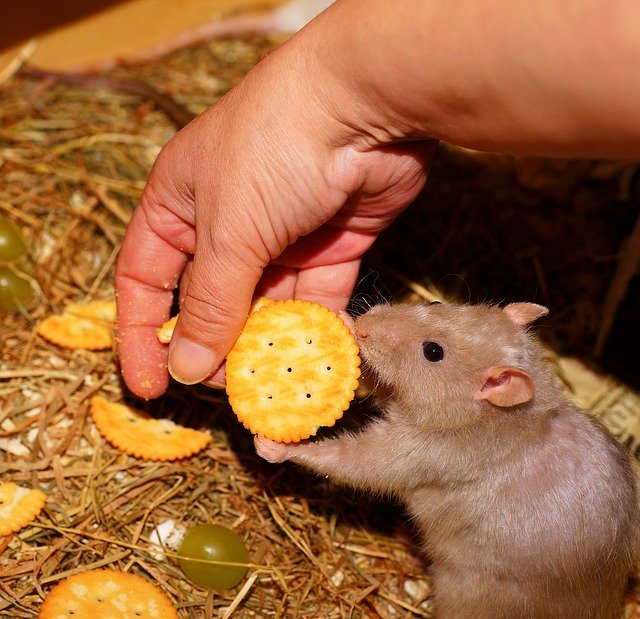Guide: What to Do If Your Pet Rat Bites You

Sudden Aggression in Mature Rats
Do you have a rat who recently and suddenly became aggressive?
Did he or she bite you, whether it was a warning bite (no blood drawn) or a serious bite (drew blood, rat bit and held on)?
If so, there are likely other symptoms that you are missing. Have you noticed any of the following behaviors?
- Rat is sleeping more, rather than playing or climbing
- Not interested in exploring outside of the cage
- Doesn’t care for cuddling or attention from people suddenly
- Has a poor appetite, or is losing weight
- Whimpering, whining, and squealing
- Aggression towards cagemates
- Potential pregnancy (swollen belly)
- Loss of motor skills or balance; rat acts drunk (signals potential brain/pituitary tumor or ear infection)

Pain: Illness or Injury
If your rat is in pain, it can become withdrawn and aggressive. If you can, evaluate your rat for signs of injury or illness. Look for swollen limbs, injured toes, lacerations, or areas that are hot to the touch. Be sure to watch for limping, as well.
If there are no obvious injuries, look for signs of illness such as excessive porphyrine around the eyes and nose, wheezing and rattling, distended abdomen, lack of appetite, squeaking, excessive thirst, unusual stool, and hair loss/lack of luster.
Pregnancy: Hormonal Fluctuations
If your rat could potentially be pregnant, she may become very aggressive up to a week before delivery. She may show aggressive behavior towards people and cage mates, with cage mates usually getting the worst of the aggression. They will guard their nesting area fiercely, keeping other rats away.
This normally calms a few days after the rat gives birth, with most aggressive behavior towards humans dissipating as soon as the female rat learns her kits are safe in the presence of the owner.

Aggression In Rescue Rats
If you’ve recently adopted a rescue rat, you have a few different potential issues that you may be facing. It can be harder to diagnose rescue rats as you never know what type of conditions the animal came from.
Try diagnosing one of these issues among the rat, especially if the animal is healthy with no signs of illness:
- Pregnancy: Many female rescues come in pregnant, unfortunately. If the previous owner had multiple rats, consider pregnancy. Date the calendar for 25 days, and watch for signs of pregnancy.
- Abuse or Trauma: If there is any indication of potential abuse, the rat may require some rehabilitation. If the rat has had to defend itself, it can take some time to alter these behaviors.
- Undomesticated: If the rat acts quite wild and distrusting of humans, he or she will require some taming. Rats will flee in fear, and will bite in many cases if cornered. This aggression is usually a result of fear.
- Learned Behavior: If a rat nips at someone in an effort to be left alone, as they might with children who are being rough with them, they can quickly learn to use nipping and biting to get what they want. This behavior can easily be eliminated with training.
- New, Stressful Environment, Dealing with Pecking Order, Etc: If the rat is in a new environment or exposed to new rats, he or she could become aggressive. This could be a result of fear, or stress overall. Wait for the rat to adjust to his or her new surroundings, settle a new pecking order, and re-evaluate.
- Raging Hormones: If you’re dealing with male rats, they may smell a female in estrus; or, they could simply be aggressive towards other males. Reproductive hormones can cause males to act much more aggressively in rare cases. If you’ve been bitten by a normally calm male rat, after handling a strange male rat, this is likely the cause of the bite.
- The Naturally Aggressive Rat: If you’ve exhausted all avenues and still have a healthy rat on your hands, you might have a rat who is aggressive by nature. This rat will bite for no reason, and will lunge at the cage as people walk by. Bites commonly draw blood, rather than being simple warning bites. This rat is insistent when it comes to attacking, and commonly shows no fear at all; he or she is not afraid of others.

Aggression Developing at 3 to 9 Months of Age
If a rat becomes aggressive during this time period, it may be related to maturity and hormones. This is especially true of alpha animals, who are trying to become the “top rat.” Generally, this aggression won’t be directed at people.
However, there are exceptions. If your rat begins displaying aggressive behavior at this age, eliminate all other potential causes of aggressive behavior: illness, injury, pregnancy, past abuse or trauma, etc.
If you are left with a healthy rat who isn’t aggressive by nature, it is likely related to his or her hormones.

What to Do in the Face of Aggressive Rat Behavior
Before you do anything, arm yourself with gloves, a long sleeved shirt, and first aid.
- In Cases of Illness or Injury: Please take your rat to the vet for treatment. Illness or injury that causes the rat to resort to biting is actually quite serious. I’ve rarely seen rats resorting to biting when injured or ill.
- Dealing with Pregnancy: If you suspect pregnancy, place the rat into a cage by herself. Try to clean the cage every 2 days, stopping when she delivers her kits. Avoid changing litter for 1 week if she is aggressive; aggressive behavior means she’s unsure of your intentions, and may sense that you are a threat. She could abandon her litter if the cage is tampered with during this time. This behavior should begin to disappear 7 to 14 days after birth, and will disappear within 21 to 28 days normally.
- How to Curb Aggressive Behavior in Maturing Rats: If the rat is reaching maturity and displaying aggressive behavior, a simple way to help this issue is to spay or neuter the animal. This is especially effective in male rats who have aggressive tendencies.
- Allowing New Rats to Settle In: If aggressive behavior surfaces in a new environment with strange rats, allow the animal time to settle in. Watch rats closely for signs of injury as introductions become longer, with final transitions being monitored closely as well. The animal may not show aggressive behavior during quarantine, but might during the transition. If there are serious injuries among the rats, halt all introductions and cage mergers among the offending rat.
- Taming Fearful Rats: If an animal is afraid, begin with trust exercises. Allow the rat to come to you on his or her own terms, and keep the animal in the room that you frequent most often. As time progresses, he or she will become more confident in your presence, and the trust exercises will result in the rat becoming more confident in physical interactions. Some rats will never fully tame, always being timid to some degree. This is natural and common; every rat has a different personality. Some will always be shy, timid, and flighty creatures.
- Learned Behaviors: I largely recommend that this only be performed by an experienced rescuer or handler; someone who can accurately read a rat’s personality and behavior. If a rat has learned to bite to get his or her way, don’t give in to the rat. If the rat is giving warning bites as a means to avoid being picked up, and is otherwise healthy and not fearful, you will need to do the opposite of what the rat expects the outcome to be. If the rat does not want to be picked up, simply pet the rat for 5 or 10 minutes every time he or she bites. Be sure to wear gloves for this, that are covered in your scent. Within a few short days, the rat will likely stop biting. In addition, he or she may learn to enjoy the attention, and you might find that the rat is leaping onto you to spend time with you. You’re reversing learned behavior in this situation.
- Abuse or Trauma: If the rat has been abused, you will need to resort to trust behaviors. Utilize the advise for undomesticated animals, and as progress occurs, you may have to deal with reversing learned behaviors. Situations of abuse and trauma can be trick situations, and are best left to those who have experience here. Many abused animals will rebound very quickly, but there are some who have a hard time recovering psychologically.